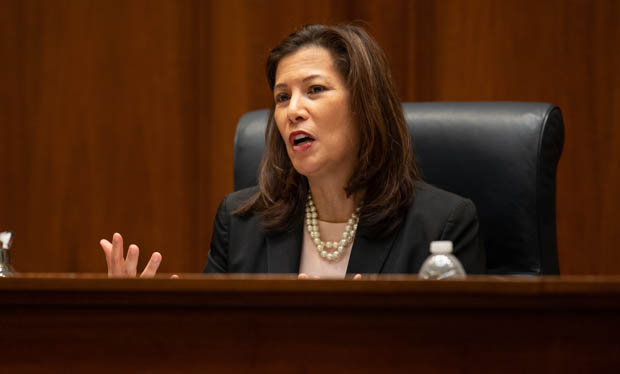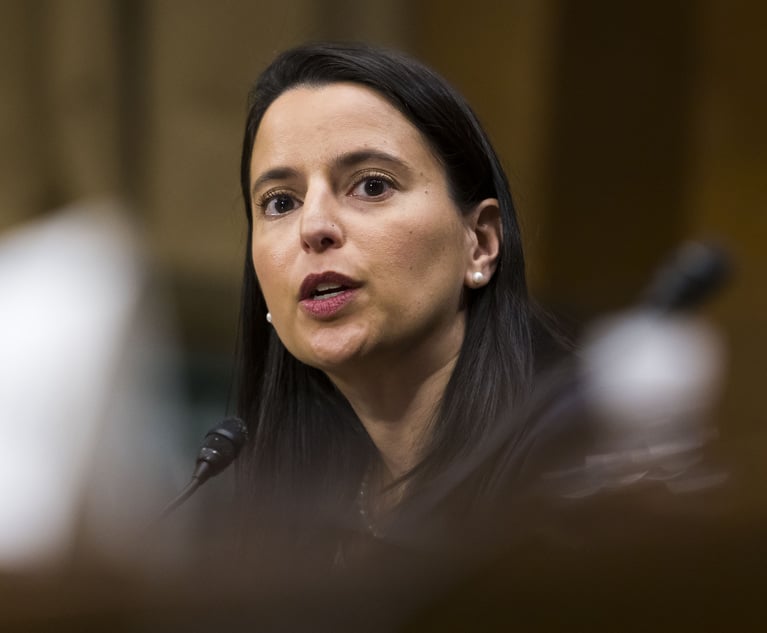Justice Ming Chin Announces Retirement From California Supreme Court
"The judicial system has faced some major challenges in my time on the bench, but I believe the branch is now in a strong position," Justice Ming Chin said.
January 15, 2020 at 12:56 PM
5 minute read
 California Supreme Court Justice Ming Chin. Photo: Jason Doiy/ALM)
California Supreme Court Justice Ming Chin. Photo: Jason Doiy/ALM)
Ming Chin, the longest-tenured and one of the most conservative members of the California Supreme Court, has announced he will retire at the end of August, giving Gov. Gavin Newsom his first opportunity to shape the court.
Chin, 77, notified the governor's office of his plans this week and informed his colleagues Wednesday at the court's weekly conference in San Francisco. Chin was not immediately available for comment, but he said in a statement released by the court that he's had "the honor and privilege to serve with three very different but spectacular chief justices" during his nearly 24 years as an associate justice.
"The judicial system has faced some major challenges in my time on the bench, but I believe the branch is now in a strong position," he said. "Justice Chuck Vogel once said my opinions are characterized by clarity and courage. If that is what is written about me in 50 years, I would be happy."
Chin's departure will give Newsom his first nomination to the high court and will likely expand the center-left majority created by former Gov. Jerry Brown's four appointments.
The son of immigrant Oregon potato farmers, Chin became California's first Chinese American Supreme Court justice and a renowned expert on DNA science. He is a prolific writer, having authored more than 350 majority opinions and 100 separate opinions over three decades. He wrote two legal practice guides, one on employment litigation and the other on forensic DNA evidence, and chaired Judicial Council and court committees focused on technology, science and the law and judicial impartiality.
"I have long admired Justice Chin, and his loss to this court will be incalculable," Chief Justice Tani Cantil-Sakauye said in a statement. "He has been a valuable mentor who took me under his wing when I first became chief justice … His signature mix of intelligence, wisdom and practicality will be greatly missed."
Chin was an Alameda County prosecutor and later a partner at the Oakland firm of Aiken, Kramer & Cummings. He was named to the Alameda County Superior Court bench in 1988 and nominated to the First District Court of Appeal two years later. In 1996, Republican Gov. Pete Wilson selected Chin to succeed Armand Arabian as an associate justice on the California Supreme Court.
Viewed as a political moderate, particularly when compared to the conservative Arabian, Chin immediately drew criticism from the right when he told reporters before his confirmation hearing that he personally supported abortion rights. Chin assured the three members of the Commission on Judicial Appointments that his personal views would not influence his rulings. His nomination was confirmed unanimously.
"I've learned something," Chin said after the proceedings, according to an account in the San Francisco Chronicle. With a smile, he added: "I'm not going to say in public what it is."
Generally considered pro-prosecution and pro-business, Chin was the lone dissent in the 2019 case of OTO LLC v. Kho, in which the majority held that a workplace arbitration agreement was procedurally unconscionable.
 Chief Justice of California Tani G. Cantil-Sakauye (Photo: Jason Doiy/ALM)
Chief Justice of California Tani G. Cantil-Sakauye (Photo: Jason Doiy/ALM)"Today, the majority holds that an arbitration agreement is substantively unconscionable—and therefore unenforceable—precisely because it prescribes procedures that, according to the majority, have been 'carefully crafted to ensure fairness to both sides,'" Chin wrote. "If you find that conclusion hard to grasp and counterintuitive, so do I."
The employer in the case, OTO LLC, represented by lawyers from Paul, Weiss Rifkind, Wharton & Garrison, repeatedly cited Chin's dissent in asking the U.S. Supreme Court to take up the case.
Chin also joined the dissent in In Re Marriage Cases, the 2008 opinion that held that California's constitution guarantees the rights of all residents, including same-sex couples, to marry. Chin and Associate Justice Marvin Baxter called the majority's opinion an "exercise in legal jujitsu" that will "create a constitutional right from whole cloth."
But Chin's judicial record can't always be neatly classified. In 1997, he was part of the Supreme Court majority that struck down a law requiring a teenager to obtain her parent's consent before having an abortion. He also joined the unanimous court in Dynamex, the 2018 ruling overhauling California's worker classification rules.
Chin and his wife of 48 years, Carol, have two children. Jennifer Chin is a senior counsel for the University of California's Office of the President. Jason Chin, like his father before, is an Alameda County Superior Court judge.
Read more:
What Newsom's First Judicial Picks Reveal About His Appointment Philosophy
Newsom's First Batch of Court Appointments Includes New Women Judges
Tom Girardi, Facebook's Paul Grewal and Others Will Vet Newsom Judges
Newsom Picks Martin Jenkins for Judicial Appointments Secretary
Joshua Groban, Brown's Fourth Nominee, Confirmed to California's High Court
This content has been archived. It is available through our partners, LexisNexis® and Bloomberg Law.
To view this content, please continue to their sites.
Not a Lexis Subscriber?
Subscribe Now
Not a Bloomberg Law Subscriber?
Subscribe Now
NOT FOR REPRINT
© 2025 ALM Global, LLC, All Rights Reserved. Request academic re-use from www.copyright.com. All other uses, submit a request to [email protected]. For more information visit Asset & Logo Licensing.
You Might Like
View All
Judge Accuses Trump of Constitutional End Run, Blocks Citizenship Order
3 minute read
Chicago Law Requiring Women, Minority Ownership Stake in Casinos Is Unconstitutional, New Suit Claims
5 minute read
Law Firms Mentioned
Trending Stories
- 1States Accuse Trump of Thwarting Court's Funding Restoration Order
- 2Microsoft Becomes Latest Tech Company to Face Claims of Stealing Marketing Commissions From Influencers
- 3Coral Gables Attorney Busted for Stalking Lawyer
- 4Trump's DOJ Delays Releasing Jan. 6 FBI Agents List Under Consent Order
- 5Securities Report Says That 2024 Settlements Passed a Total of $5.2B
Who Got The Work
J. Brugh Lower of Gibbons has entered an appearance for industrial equipment supplier Devco Corporation in a pending trademark infringement lawsuit. The suit, accusing the defendant of selling knock-off Graco products, was filed Dec. 18 in New Jersey District Court by Rivkin Radler on behalf of Graco Inc. and Graco Minnesota. The case, assigned to U.S. District Judge Zahid N. Quraishi, is 3:24-cv-11294, Graco Inc. et al v. Devco Corporation.
Who Got The Work
Rebecca Maller-Stein and Kent A. Yalowitz of Arnold & Porter Kaye Scholer have entered their appearances for Hanaco Venture Capital and its executives, Lior Prosor and David Frankel, in a pending securities lawsuit. The action, filed on Dec. 24 in New York Southern District Court by Zell, Aron & Co. on behalf of Goldeneye Advisors, accuses the defendants of negligently and fraudulently managing the plaintiff's $1 million investment. The case, assigned to U.S. District Judge Vernon S. Broderick, is 1:24-cv-09918, Goldeneye Advisors, LLC v. Hanaco Venture Capital, Ltd. et al.
Who Got The Work
Attorneys from A&O Shearman has stepped in as defense counsel for Toronto-Dominion Bank and other defendants in a pending securities class action. The suit, filed Dec. 11 in New York Southern District Court by Bleichmar Fonti & Auld, accuses the defendants of concealing the bank's 'pervasive' deficiencies in regards to its compliance with the Bank Secrecy Act and the quality of its anti-money laundering controls. The case, assigned to U.S. District Judge Arun Subramanian, is 1:24-cv-09445, Gonzalez v. The Toronto-Dominion Bank et al.
Who Got The Work
Crown Castle International, a Pennsylvania company providing shared communications infrastructure, has turned to Luke D. Wolf of Gordon Rees Scully Mansukhani to fend off a pending breach-of-contract lawsuit. The court action, filed Nov. 25 in Michigan Eastern District Court by Hooper Hathaway PC on behalf of The Town Residences LLC, accuses Crown Castle of failing to transfer approximately $30,000 in utility payments from T-Mobile in breach of a roof-top lease and assignment agreement. The case, assigned to U.S. District Judge Susan K. Declercq, is 2:24-cv-13131, The Town Residences LLC v. T-Mobile US, Inc. et al.
Who Got The Work
Wilfred P. Coronato and Daniel M. Schwartz of McCarter & English have stepped in as defense counsel to Electrolux Home Products Inc. in a pending product liability lawsuit. The court action, filed Nov. 26 in New York Eastern District Court by Poulos Lopiccolo PC and Nagel Rice LLP on behalf of David Stern, alleges that the defendant's refrigerators’ drawers and shelving repeatedly break and fall apart within months after purchase. The case, assigned to U.S. District Judge Joan M. Azrack, is 2:24-cv-08204, Stern v. Electrolux Home Products, Inc.
Featured Firms
Law Offices of Gary Martin Hays & Associates, P.C.
(470) 294-1674
Law Offices of Mark E. Salomone
(857) 444-6468
Smith & Hassler
(713) 739-1250







